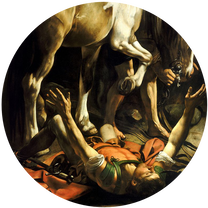Introduction
Without a doubt the most influential theological works of human history, the letters of St. Paul (c. 50-64 A.D.) comprise some of the earliest and most significant Christian documents. Addressed to some of the early Christian communities across the Mediterranean, the epistles contain invaluable insights into the beliefs, practices, concerns and controversies of the early Church. As part of the canon of the New Testament, they are the foundational texts of the Christian faith and its ethics.
Recommended Reading
The letters to the Romans, Corinthians, Galatians, Ephesians, Philippians, Colossians, and Thessalonians in The Holy Bible containing the Old and New Testaments (New Revised Standard Version), ed. Zayne Ridling, Oxford University Press, 1989.
To download a short excerpt, please click on the link below:
Recommended Reading
The letters to the Romans, Corinthians, Galatians, Ephesians, Philippians, Colossians, and Thessalonians in The Holy Bible containing the Old and New Testaments (New Revised Standard Version), ed. Zayne Ridling, Oxford University Press, 1989.
To download a short excerpt, please click on the link below:
| fypa6epistles.pdf | |
| File Size: | 48 kb |
| File Type: | |
Questions for Reflection and Discussion
What did the early Church believe about the person of Jesus Christ?
What roles do community and liturgy play in the Epistles?
What is the place of philosophy in the life of a Christian? Are there any parallels to be drawn between the Epistles and the Greek texts we’ve already studied? What are the differences?
What roles do community and liturgy play in the Epistles?
What is the place of philosophy in the life of a Christian? Are there any parallels to be drawn between the Epistles and the Greek texts we’ve already studied? What are the differences?
“If I speak in the tongues of mortals and of angels, but do not have love, I am a noisy gong or a clanging cymbal. And if I have prophetic powers, and understand all mysteries and all knowledge, and if I have all faith, so as to remove mountains, but do not have love, I am nothing. If I give away all my possessions, and if I hand over my body so that I may boast, but do not have love, I gain nothing. Love is patient; love is kind; love is not envious or boastful or arrogant or rude. It does not insist on its own way; it is not irritable or resentful; it does not rejoice in wrongdoing, but rejoices in the truth. It bears all things, believes all things, hopes all things, endures all things. Love never ends. But as for prophecies, they will come to an end; as for tongues, they will cease; as for knowledge, it will come to an end. For we know only in part, and we prophesy only in part; but when the complete comes, the partial will come to an end.”



